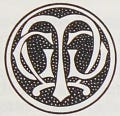MacDonald-specific posts can be found here, and opted in to, or out of, separately from my main newsletter here.
To know one's self safe amid storms and darkness and fire and water, amid disease and pain, even during the felt approach of death, is to be a Christian.
– George MacDonald
The default state of a Christian is Joy, and when it is not, the ideal response of a Christian to storms, darkness, trials, dejections, and pain, is to be developing—strengthening—the faculties of Joy:
Consider it as all joy, my brethren, when you fall into various trials, knowing that the testing of your faith produces endurance. Let endurance have its full effect, so that you may be perfect and whole, lacking in nothing. (James 1:2-4 EOB)
MacDonald has an interesting turn here: it isn't just Joy, or developing Joy. It has to do self amidst trials:
“To know one’s self safe”
To be a Christian doesn’t mean one is happy. Sometimes, perhaps often, it doesn’t mean one is particularly holy. To be a Christian is to have a secure identity. No matter what people might say about someone, no matter the setbacks, hardship, even torture, a Christian can rest—be totally secure—in the fact that he or she is in Christ. A Christian can go through life and be objectively assured of being in Christ through 1) the fact of Baptism: this establishes your identity, not according to you, but it is given to you through the work of the Holy Spirit. 2) a life choosing to cooperate with the will God, which is accepting the identity that was assigned to the Christian at Baptism, and living into it. This is sometimes called sanctification. In the East, it is called theosis.
This is the faithful acceptance of the Grace that Christ freely offers us, and in this acceptance we are choosing to repent of those decisions we make holding on to our old identity in the fruits of Adam—our sins—and choose to seek amendment of life. This is the process of cooperating with Christ as he guides us to form our wills to be less like what the world says we are—what we think we say we are—and instead who he knows we are as children of God.
The radical move of the Gospel, shown in Jesus’ teaching and Paul's epistles is that we belong to Christ, and no force on earth (except ourselves) can take that from us. Storms, poverty, betrayal, bad churches, good churches, bereavement, depression, disease—all these things have no bearing on the person that Christ sees in us: the person he is calling us towards. To be a Christian is to put one’s faith in Christ to always know who we are, even when we don't and when the world tries to impose itself on our self:
My sheep hear my voice, and I know them, and they follow me: And I give unto them eternal life; and they shall never perish, neither shall any man pluck them out of my hand. (John 10:27-28 KJV)
{ιμκ☩}




